Annual Newsletter – 2014
Contact
Environmental StudiesOlin-Rice Science Center, Room 249 651-696-6274
esson@macalester.edu
instagram twitter

A Publication of Macalester’s Environmental Studies Department
September 2014

Letter From the Chair
Dear Friends of Environmental Studies,
I was on sabbatical last year and have something of an “outsiders” view of what occurred last year in the department. First I’d like to thank Prof. Roopali Phadke for doing a great job chairing while I was gone. The department functioned well and we all owe a debt of gratitude to Roopali for taking over the leadership of the department.
We had 13 students graduate in May 2014, down from our down from 22 in 2013. Of the 2014 graduates 7 had disciplinary emphases and 6 had interdisciplinary emphases, which continues a trend of more students choosing interdisciplinary emphases. A recent accounting from the Registrar’s office lists 49 majors and 24 minors with 15 of the majors slated to graduate in May 2015. I encourage you to look at the department’s website where you will be able to view the latest assessment report which includes information on the senior survey given to the 2014 graduates. By in large, the graduates were quite pleased with their time at Macalester in the ES department.
I also encourage you to read the updates in this newsletter from each faculty member. You should be proud of the great faculty and staff in this department. They are a productive group, which translates into an outstanding educational experience for our students. This year Prof. Louisa Bradtmiller will be coming up for her tenure review. Many of you may have been contacted by Prof. Phadke or the Dean of Academic Programs office to comment on Louisa’s work while at Macalester. I want to thank all of those who took the time and effort to supply thoughtful comments on her teaching and service.
The upcoming year looks to be another great year in the department. We have hired Anika Bratt to teach ENVI 144 Lakes, Streams and Rivers. Anika is a PhD student in the Ecology, Evolution and Behavior Department at the University of Minnesota. She studies biogeochemistry and ecology in lakes and stream and at the aquatic-terrestrial interface and much of her dissertation research is conducted locally in Twin Cities metro area lakes and streams. She has taught in introductory and advanced undergraduate courses both at the University of Minnesota and at St. Catherine University where she received her undergraduate degree. While not formally in our department, two environmental historians will be on campus next year – Ryan Edgington returns and Julia Fein will be teaching Environmental History of Modern Europe. Also the visiting Humphrey Professor in Geography, Robert Rose, will be teaching courses in remote sensing and land change and conservation planning. Add to this the great slate of EnviroThursday speakers lined up for the fall and there should be lots of opportunities for all to have large doses of the environment this year.
Graduating seniors, Mike Galgay and Karen Weldon were acknowledged by the department for their contributions to the department over their 4 years at Macalester. Mike Galgay was awarded the Environmental Studies Scholarship Award. Mike hails from upstate New York, and he returned to that region during the summer of 2012 for the Odum Internship in Field Ecology at the Huyck Preserve and Biological Research Station. Mike spent the following summer on campus working with Professor Bradtmiller on research into past changes in ocean nutrient cycles, which he subsequently used as the basis for his Honors thesis. After graduation Mike returned to New York to work in the outdoors industry in the beautiful Adirondack Mountains while planning his next steps. Karen Weldon was the 2014 recipient of the Environmental Studies Citizenship Award. Karen, who grew up in Oklahoma, worked on a wide range of environmental initiatives during her time at Macalester. In addition to doing a variety of work through the campus Sustainability Office, she lived in the EcoHouse and worked as the sustainability student worker for Bon Appetit, where she was instrumental in convincing college leaders to sign the Real Food Campus Commitment. She also played an important leadership role in the Senior Seminar, which organized a series of Earth Day Revival events, and served as preceptor for the course American Environmental History.
Dan Hornbach
Chair, Environmental Studies

Environmental Studies Student Award Winners
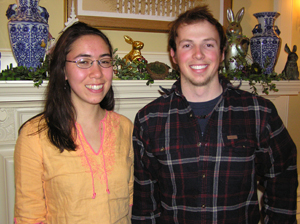
The 2014 Environmental Studies Student Award winners are:
Environmental Studies Citizenship Award:
Karen Weldon
Environmental Studies Scholarship Award:
Michael Galgay

2014 Environmental Studies Distinguished Speaker – Adam Rome
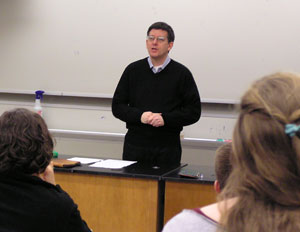
The 2014 Enviornmental Studies Distinguished Speaker was Adam Rose, Unidel Helen Gouldner Chair for the Environment at the University of Delaware. Adam’s presentation was titled “The Genius of Earth Day.”
Description of his talk: The first Earth Day had a power and freshness that are hard to imagine now. Earth Day 1970 inspired the first green generation. Earth Day 1970 also helped to build a lasting eco-infrastructure. What made the event so powerful? The story of the first Earth Day offers important lessons for environmentalists today.
Adam Rome teaches courses in environmental history and environmental non-fiction. He is the author of two books: The Genius of Earth Day: How a 1970 Teach-In Unexpectedly Made the First Green Generation (2013) and The Bulldozer in the Countryside: Suburban Sprawl and the Rise of American Environmentalism (2001), which won the Organization of American Historians’ Frederick Jackson Turner award. From 2002 through 2005, he edited the journal Environmental History.

Environmental Studies Honors Thesis
This year, one Environmental Studies major pursued an honors thesis. Michael Galgay’s thesis is titled “Geochemical Markers of Changes in the Ocean Silicon Cycle During Heinrich Events.”
Description: Earth’s climate has been dominated by the glacial-interglacial cycle for the last million years, but smaller scale, rapid climate changes have also been found in the record. These events have been linked to significant ocean circulation changes that dramatically alter the way heat and energy is distributed around the planet. Heinrich Events are one such type of event, caused by catastrophic collapse of Northern Hemisphere ice sheets, and six have occurred in the last 60,000 years. The most recent Heinrich Event seems to even have triggered the deglaciation which started the interglacial period we live in today. This presentation presents evidence of ocean circulation and nutrient distribution changes from sediment cores that span the six most recent Heinrich Events. This work is an attempt to understand the mechanisms responsible for the relationship between ocean nutrient cycles and climate change, and the sequence of events relating Heinrich Events and glacial terminations. With our results, we hope to begin to distinguish between multiple hypotheses proposed to explain these connections.

Senior Graduation Pledge

This year 60 Macalester 2014 graduates signed the Senior Graduation Pledge and wore green ribbons at this year’s commencement ceremonies, thanks to the work of ES seniors Karen Weldon and Sabrina Upadhyay. The graduation pledge states, “I pledge to explore and take into account the social and environmental consequences of any job I consider or any organization for which I work.”
This idea first started at Manchester College, Indiana, in 1988. For some students, searching for a job means searching for companies or organizations that do not pollute streams, rivers, or the air; practice discriminatory or unfair business; or create an unfriendly work atmosphere. These students conscientiously go the extra mile in their job searches because they support this nation-wide effort.
Taking the pledge is voluntary; students determine for themselves what they consider to be socially and environmentally responsible.

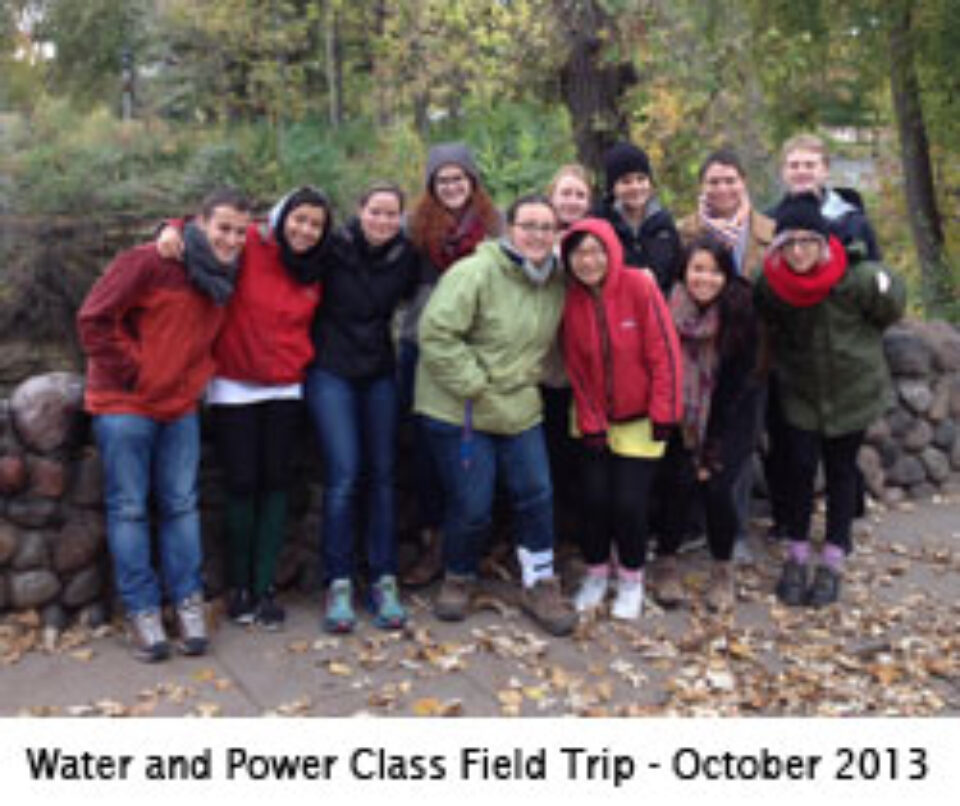
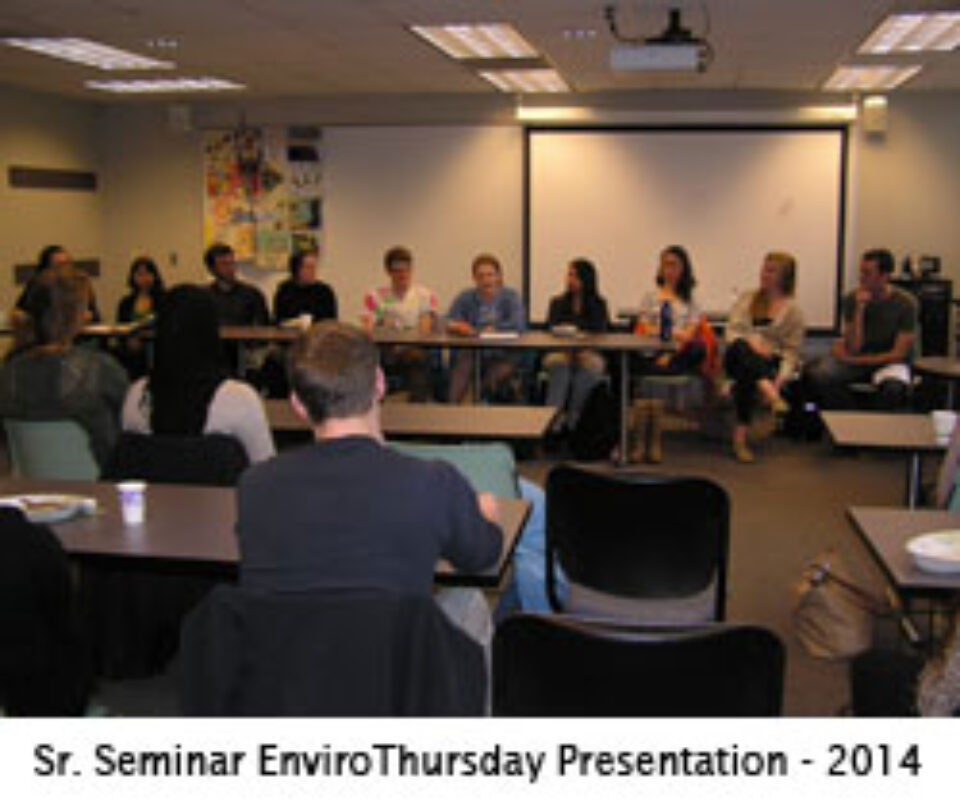
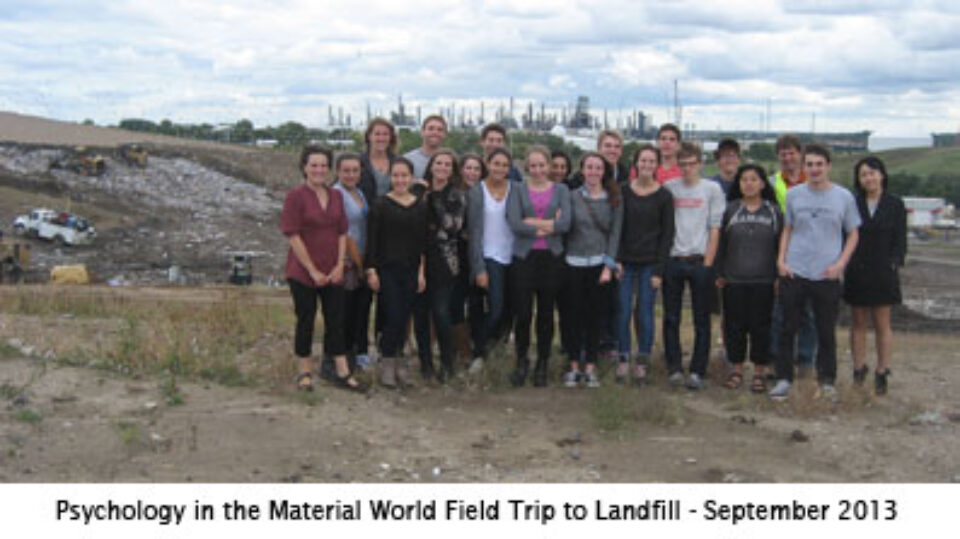

EnviroThursdays
There were 19 EnviroThursday presentations during the 2013-14 school with with over 475 in attendance.
- “Building A Sustainable Urban Farming System: The HECUA – Gandhi Mahal Farm Project” by Julia Frost Nerbonne, Director of the HECUA Agriculture and Justice Program, and Ruhel Islam, owner of Gandhi Mahal restaurant
- “Switching to Switchgrass: High-Resolution Landscape-Scale Modeling of Switchgrass Production in the U.S.” by Brian Krohn, PhD student, Natural Resource Science & Management, University of Minnesota
- “Bon Appétit Management Company: Using Purchasing Power to Grow Sustainable Food Systems” by Alyse Festenstein, Midwest Fellow, Bon Appétit Management Company Foundation
- “Using Stream Biomonitoring Science to Restore and Protect Puget Sound and How A Macalester Education Got Me Here” by Jo Opdyke Wilhelm, Ecologist, King County Department of Natural Resources and Parks, Seattle, Washington
- “Bidder 70” Film Screening
- “The Future of Traumatic Urbanization” by Matthew Jelacic, Asst. Professor of Environmental Design, University of Colorado-Boulder
- “Cultivating the Atomic Food System: The USDA, Farmers, and Civil Defense, 1955-1965” by Ryan Edgington, Department of History, Macalester College
- “The Heritage of Romanticism in Contemporary Ecopoetry” by Brenda Hillman, Olivia Filippi Professor of Poetry, St. Mary’s College of California
- “Braiding Sweetgrass: Indigenous Wisdom, Scientific Knowledge and the Teachings of Plants” by Robin Wall Kimmerer, SUNY Distinguished Teaching Professor of Environmental Biology, and founder and director of the Center for Native Peoples and the Environment
- “Health Implications of Climate Change in Minnesota” by Kelly Muellman, Planner for the Minnesota Climate and Health Program at the Minnesota Department of Health
- “The Genius of Earth Day” by Adam Rome, Unidel Helen Gouldner Chair for the Environment, University of Delaware
- “Solar for Everyone” by Ken Bradley, CEO, Minnesota Community Solar
- “Building Sustainable, Healthy and Resilient Cities Globally: Translating Research to Action” by Dr. Anu Ramaswami, Humphrey Institute at the University of MN
- “Macalester’s EcoHouse” by EcoHouse Residents Analuna Brambila, Molly Sowash, Julia Gay, and Carly Avezzano
- “The Indigenous Roots of Sustainable Forestry in the United States and an Environmental History of the Menominee Tribe of Wisconsin” by Mike Dockry, Research Natural Resource Specialist, USDA Forest Service
- “Fanning the Flame: The State of Natural Gas and How Bio/Renewable Natural Gas Fits In” by Diane Saber ’78, Ph.D., President of REEthink
- “Open Road” Film Screening by documentary filmmaker Alain LeTourneau
- Geochemical Markers of Changes in the Ocean Silicon Cycle During Heinrich Events” by Mike Galgay ’14
- “Earth Day Revival: An Experiment in Reinvigorating the Environmental Movement” by Environmental Studies Senior Seminar Students
You can read more about these presentations at www.macalester.edu/academics/environmentalstudies/envirothursday and click on the Fall 2013 and Spring 2014 links. EnviroThursdays take place every Thursday during the school year in Olin-Rice 250 at 12 noon.

Environmental Studies Faculty News
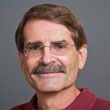
Prof. Dan Hornbach, Chair
The past year Dan was on sabbatical and had a productive year.
A manuscript that he worked on with students based on work they conducted in the summer of 2012 examining the impacts of a small dam on mussel communities in a tributary of the St. Croix River, the Sunrise River, was published in the fall of 2013 The paper, Hornbach, D.J. M.C. Hove, H. Liu, F.R. Schenck, D. Rubin and B.J. Sansom. 2014. The influence of two differently sized dams on mussel assemblages and growth. Hydrobiologia 724: 279-291, was coauthored with three Macalester students (all 2013 graduates) and one student from Washington and Jefferson College who worked in Dan’s lab. The students did a great job in collaborating with him in the development of this manuscript. He also continued a research project with the EREN network. The Ecological Research Education Network is an NSF funded network with faculty from about 180 primarily undergraduate institutions (PUIs). The network fosters research and educational projects that involve undergraduate students. One project they’re working on examines the impact of riparian vegetation on stream heat budgets at eleven locations across the United States and Canada. He is working at Valley Creek near Afton, MN, at the Belwin Conservancy. They had their first manuscript accepted for publication – Simmons, J.A., M. Anderson, W. Dress, C. Hannac, D.J. Hornbach, A. Janmaat, F. Kuserk, J. G. March, T. Murray, J. Niedzwiecki, D. Panvini, B. Pohlad, C. Thomas, and L. Vasseurk. 2014. A comparison of the stream temperature regime under forested and non-forested riparian 4 zones at eleven sites across North America. River Research and Applications (in press).
Jerald Dosch and Dan have collected significant data for the Decomposition of Aquatic and Terrestrial Invasive Species project, also sponsored by EREN. The data collection for the aquatic portion of this project has been completed and they attended an EREN meeting at Augustana College in Rock Island, IL, to discuss theirr findings so far. Jerald and Dan plan to present their preliminary findings at the St. Croix River Research Rendezvous, sponsored by the MN Science Museum in October 2014.
Kelly Macgregor and Dan, along with two researchers at the St. Anthony Falls Lab (SAFL) of the UMN, submitted a proposal to the LCCMR (MN Legislative and Citizens’ Commission on Minnesota Resources) program to examine the impact of sediment on mussel assemblages. This work would include both field studies in the MN and St. Croix Rivers and lab work at SAFL. They worked jointly to write the grant, and Kelly and Dan, along with one of the researchers from the UMN, testified before a government committee about our proposed work. They were awarded a grant for a total of $350,000 of which $177,000 goes to Macalester. The Macalester portion will support six Macalester students over the next three summers.
Dan looks forward to returning as chair of ES in 2014-2015. In addition to teaching Aquatic Ecology in the Fall, he will be chairing the College’s Resource and Planning, a committee of faculty, staff and students that addresses issues related to the efficient and effective allocation of the College’s resources.
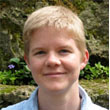
Prof. Louisa Bradtmiller
Fall 2013 was a busy semester for Louisa and her wife Kate, who welcomed their twins into the world (and the ES department) in late September. When not changing diapers, Louisa taught The Earth’s Climate System and Climate and Society. She was on parental leave in the spring semester, but still supervised the honors thesis of Mike Galgay, ’14 which focused on both rapid and longer-term changes to the West African monsoon/upwelling system and their relationship to global climate change. Louisa continues to work on ocean sediment chemistry and its relationship to climate change on glacial-interglacial timescales.

Prof. Roopali Phadke
In addition to teaching her regular set of courses in Environmental Politics, this was a busy research year. Roopali focused on the second year of a research project with her Environmental Studies colleague Christie Manning and a cohort of four great summer research assistants (Samantha Burlager, Gabby Queenan, Olivia Nelson and Akilah Sanders-Reed). They are collaborating with the City of Saint Paul and the Science Museum of Minnesota to consider how local residents can contribute to climate adaptation planning in Saint Paul. This project received funding from the Great Lakes Integrated Science Assessment, a NOAA research center. This year’s research involved organizing and analyzing the results from a series of neighborhood conferences focused on low-income neighborhoods. Lastly, she also launched a new project focused on rare earth mining policy in the United States.
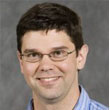
Prof. Chris Wells
Chris spent the first half of the year on sabbatical, during which he worked on an edited collection of essays on the environmental history of Minnesota, along with a handful of articles, including one recently published in the Journal of Urban History and two others forthcoming in Resilience: A Journal of the Environmental Humanities and the Journal of Transport History. In the Spring he returned to Macalester, teaching American Environmental History, Environmental Justice, and the ES Senior Seminar, which organized a series of “Earth Day Revival” events. This year he will start his tenth year at Macalester teaching a first-year course, American Environmental History, and the Senior Seminar. He will also co-teach a course in the spring, The Politics of Architecture, with Patrick Schmidt (Political Science).
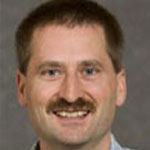
Prof. Jerald Dosch
This fall Jerald Dosch is starting his 11th year at Macalester with continuing roles in both the Environmental Studies and Biology Departments. In addition to continuing to serve as Director of Macalester’s Ordway Field Station, his 2014-15 teaching schedule will include Outdoor Environmental Education, Ecology, and Environmental Science. Jerald spent 10 weeks of the summer working at Ordway conducting ecological research with wonderful Macalester students and faculty. Their studies involved plants, turtles and birds. They published a paper on earlier research and submitted another manuscript based on 2014 work. Be sure to stop by the October 10th student research poster fair held in the Olin-Rice Smail Gallery and learn about what they accomplished.
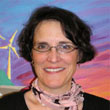
Prof. Christie Manning
Christie is returning to the ES department again this year to teach Psychology of Sustainable Behavior in the Fall and Environmental Classics in the Spring. She will also take over the reins of the EcoHouse from Chris Wells and will work with EcoHouse residents on this year’s exciting plans and projects. The rest of Christie’s time will be spent in Markim Hall. She was asked to be the Associate Director for the new Macalester Program, Educating Sustainability Ambassadors. The program is housed in the Institute for Global Citizenship. It is a three-year (and beyond) effort to infuse sustainability across the college curriculum and into the daily life of the campus community.
Christie accomplished a great deal this summer. In early July she completed a book chapter for the soon-to-be-released textbook “Psychology for Sustainability”. Students in her Psychology of Sustainability course will be reading the pre-publication version of the entire text. In June and July she collaborated with Roopali Phadke and ES students Sam Burlager, Gabby Queenan, Akilah Sanders-Reed, and Olivia Nelson on a series of community meetings in four diverse Saint Paul neighborhoods to discuss and deliberate climate change adaptation. She also worked with Psychology senior Rose Lefevre-Levy on two psychological experiments investigating psychological distance and people’s sense of moral obligation to take action on climate change. After this full summer of work, Christie left for a month to visit family and travel in Germany, Switzerland, and France. She ended the summer with her usual survey extravaganza at the State Fair, collecting around 1,000 environment and climate change attitude surveys from Minnesota fairgoers with the help of 30 Macalester volunteers (many thanks to the ES students who helped out!)
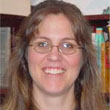
Prof. Marianne Milligan
This year, Marianne will be teaching full-time at Macalester teaching primarily in the Linguistics department. She is looking forward to teaching, 100 Words for Snow: Language and Nature, in the spring for Environmental Studies. During the unit on indigenous knowledge in that course, students researched Native American uses of plants and animals found at the Ordway Field Station creating pages on ethnobiology for the Ordwepedia website. She is also representing non-tenure track faculty on the Resources and Planning Committee in the fall.